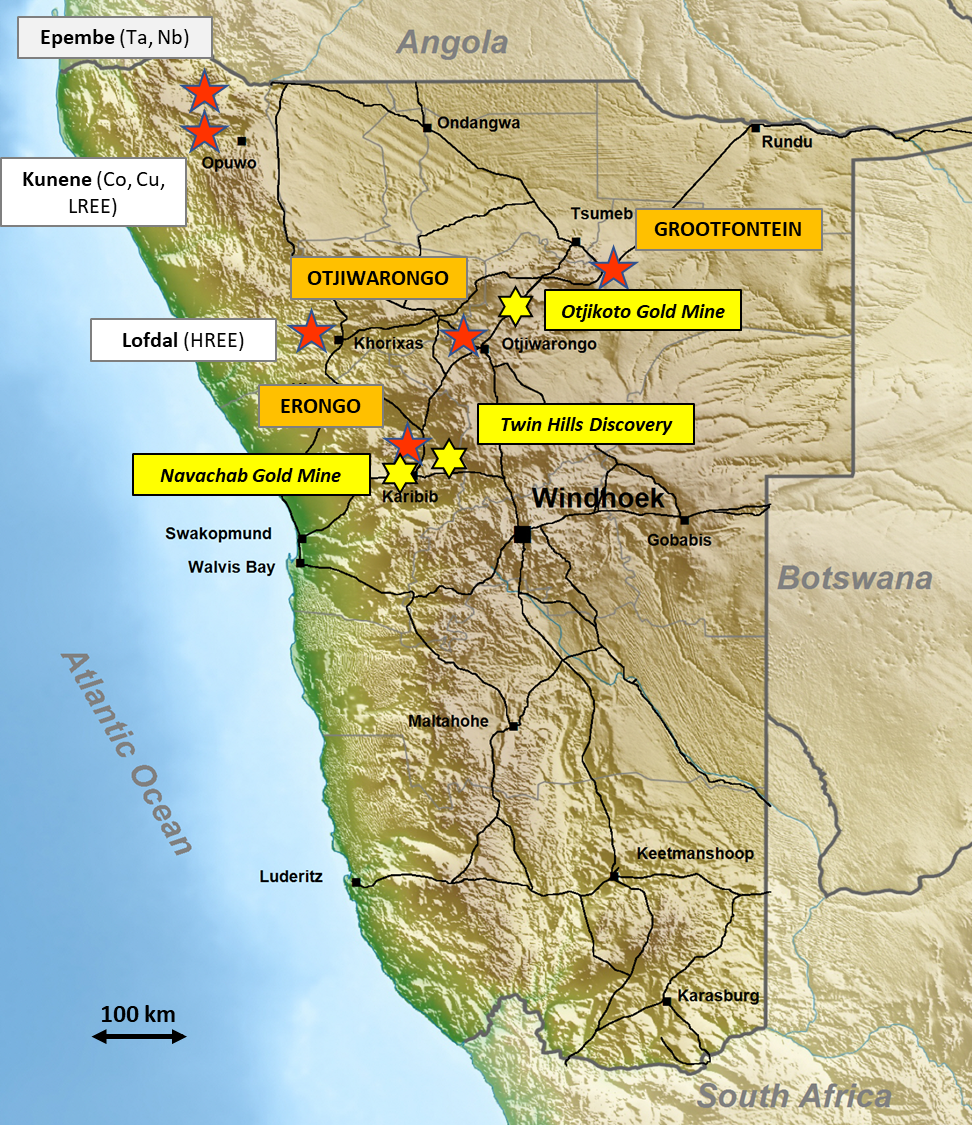


Namibia is positioning itself as a key player in the global supply chain for critical minerals needed for the green energy transition. Speaking at a minerals discussion in Windhoek, Minister of Mines and Energy Tom Alweendo outlined the country's strategy to leverage its rich mineral resources and attract international investment for a competitive critical minerals sector. Alweendo stressed the importance of global coordination and dialogue for the sustainability of critical minerals supply chains, and highlighted Namibia's approach to the energy transition, advocating for a just process that considers African circumstances. With its vision to be a significant and trusted player in the global supply chain, Namibia aims to create jobs across the value chain, from exploration to manufacturing.
Namibia's Aspiration to Become a Critical Mineral Powerhouse
Namibia, a country rich in untapped mineral resources, has set its sights on becoming a major player in the global supply chain for critical minerals. These minerals, essential for the production of green technologies, are in high demand due to the increasing global shift towards renewable energy sources.
Namibia's Strategic Advantage
Namibia's geological endowment provides a unique advantage for its critical minerals ambitions. The country possesses significant deposits of lithium, cobalt, copper, rare earth elements, and other minerals vital for the production of electric vehicle batteries, solar panels, and wind turbines.
Government Initiatives
Recognizing the potential of its mineral wealth, the Namibian government has developed a comprehensive strategy to leverage its resources sustainably. Key initiatives include:
Global Significance
Namibia's aspiration has been recognized globally. The country's strategic positioning in the supply chain of critical minerals is crucial for the world's transition to a sustainable energy future. With its commitment to responsible resource management, Namibia aims to contribute to a just and equitable energy transition that takes into account the needs of African countries.
Top 5 FAQs and Answers
1. What are critical minerals? Answer: Critical minerals are elements or compounds essential for the production of high-tech products, such as electric vehicle batteries, renewable energy systems, and medical devices.
2. Why is Namibia well-positioned to be a critical mineral powerhouse? Answer: Namibia has significant untapped deposits of lithium, cobalt, copper, and other critical minerals.
3. What is the Namibian government's strategy for developing its critical minerals sector? Answer: The government has established a regulatory framework, invested in infrastructure, and is promoting partnerships with international investors.
4. How does Namibia's approach align with the global energy transition? Answer: Namibia advocates for a just and equitable energy transition that considers the needs of African countries and ensures the sustainable supply of critical minerals.
5. What are the benefits of developing Namibia's critical minerals sector? Answer: It will create jobs, boost economic growth, and contribute to global efforts to achieve net-zero emissions.

In an attack at a public Hanukkah celebration at Bondi Beach, Sydney, a father-son duo opened fire, killing 16 people and injuring 40. While one gunman has been identified as Naveed Akram, the other has been identified as Sajid Akram, both Pakistani nationals. It was revealed that Sajid Akram had held a gun license for 10 years, and his son was previously investigated by Australia's domestic intelligence agency for his ties to an IS terrorism cell. The shooting has been condemned as a deliberate targeting of the Jewish community on the first day of Hanukkah.

The two men responsible for the Bondi Beach mass shooting have been revealed as a father and son duo. New South Wales police have identified the shooters as 24-year-old Naveed Akram and his father, Sajid Akram, aged 50. Naveed was apprehended at the scene and is currently in a critical but stable condition under police guard. Meanwhile, Sajid, who owned a fruit shop, was killed at the scene of the attack.

The city of Los Angeles is on high alert after a horrific mass shooting at a Hanukkah celebration in Sydney, Australia, which claimed the lives of 16 people. In response, the LAPD has announced additional patrols at Jewish facilities and events throughout the county, while also expressing solidarity with the Jewish community. The public is advised to remain vigilant and report any suspicious activity, and local religious institutions are urged to review their security protocols. The tragic incident serves as a reminder of the need for global unity in standing against hate and violence.

In a statement released on Sunday, Hamas confirmed the death of one of its top commanders, Raed Saad, who was killed in an Israeli strike outside of Gaza City. Israel had identified him as a key figure responsible for a 2023 attack that led to the recent conflict in Gaza. Amidst ongoing tensions, Hamas has also announced the appointment of a new commander, vowing to respond to Israel's "aggression".

Leaders from around the world expressed shock and solidarity after a terrorist attack at Bondi Beach in Sydney, Australia killed at least 11 people during a Hanukkah event. Australian police have declared the incident a terrorist attack and are working to identify those responsible. Indian Prime Minister Narendra Modi strongly condemned the attack, stating that India has zero tolerance towards terrorism. Leaders from Europe, the Middle East, and the Pacific also sent messages of condolence and denounced the violence.

In a shocking turn of events, the identity of one of the shooters responsible for the massacre at Bondi Beach has been revealed. Naveed Akram, a 24-year-old from Sydney's south-west, was identified by authorities after his involvement was confirmed. His family's home is currently being searched by police, and Akram himself is in custody after being shot and treated by emergency services. This tragic event has sent shockwaves through Australia's most famous beach.

The Israel Defense Forces (IDF) has announced the death of Ra'ad Sa'ad, the head of Hamas' Weapons Production Headquarters and one of the architects of the 2023 massacre. The IDF has stated that Sa'ad's death significantly degrades Hamas' ability to rebuild its military capabilities. He had been actively violating the U.S.-brokered ceasefire and was considered a high-ranking member of Hamas in Gaza.

Following a mass shooting at a Jewish holiday celebration at Sydney's Bondi Beach, the Australian authorities have identified the suspect as 24-year-old Naveed Akram. One gunman was killed at the scene, while the other was taken into custody. If not for the heroic actions of a fruit shop owner who disarmed one of the gunmen, the death toll could have been much higher. Australian Prime Minister Anthony Albanese denounced the attack as an act of antisemitic terrorism that has shocked the nation.

Amid the tragic shooting at a Jewish prayer gathering in Bondi Beach, Australia, a heroic bystander has emerged as a savior. Ahmed Al Ahmed, a 43-year-old fruit shop owner and father of two, risked his own life by single-handedly disarming a gunman during the attack. His actions have been praised by leaders around the world, leading to calls for him to be recognized as a true hero. While his identity has not been officially confirmed, his brave act has not gone unnoticed, and he is being hailed as a symbol of courage and selflessness in the face of terror.

Category: International Title: Luthra Brothers Accused of High-Profile Fraud Cases Likely to Be Deported to India in 24-48 Hours The Luthra brothers, Rajiv and Sanjay Luthra, accused in multiple high-profile fraud cases and wanted by the Indian authorities, are expected to be deported back to India within the next 24-48 hours. The Central Bureau of Investigation (CBI) has confirmed that steps are being taken to complete all necessary procedures with Interpol's help. The brothers, who have been evading arrest for several years, were recently located and arrested in a foreign country.